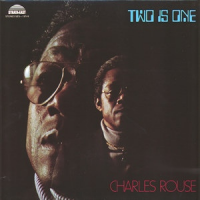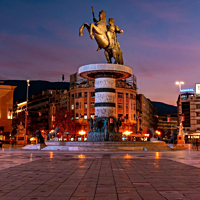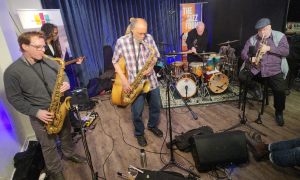Home » Jazz Articles » Live Review » Brian Marsella Trio at International Jazz Day Celebratio...
Brian Marsella Trio at International Jazz Day Celebration, Macedonia

Courtesy Aleksandar Stojcheski
Macedonian National Theater
International Jazz Day
Skopje, Macedonia
April 30, 2025
On a quiet spring evening in Skopje, the Brian Marsella Trio took the stage at the International Jazz Day Celebration and unfolded a concert that was anything but quiet. It was a performance rich with storytelling, abstract soundscapes and tight interplay, a vivid journey told through seven pieces that showcased the trio's chemistry, playfulness and emotional depth.
The night opened with "Explaining Extreme Topography," Marsella's own composition and something of a mission statement. Driven by sharp rhythmic turns and melodic eddies, it had the kind of kinetic energy that grabs the listener from the first bar. Marsella's playing here was not unlike watching a painter splash colors across a large canvas—bold, abstract, but deeply intentional. Trevor Dunn and Kenny Wollesen were anything but side men; they were his co-conspirators, grounding and lifting the music with elegance and precision.
The second tune, "Parymel," from John Zorn's Buer, Book of Angels vol. 31 (Tzadik, 2017), pulled us into a different world. The trio played it as a straight-ahead jazz piece. but left room for tension and surprise. Jewish melodic inflections floated just beneath the surface, never overt but always present, like a scent you cannot quite place. The rhythm section was supple, responding to Marsella's every move with agility. Dunn's bass lines danced between tradition and abstraction, while Wollesen's drumming had the lightness of touch that made everything breathe.
Then came the heart of the evening: "Czestochowa," a slow, mournful piece dedicated to Marsella's grandmother. With a tone that felt both personal and universal, it was one of the most affecting moments of the concert. Rooted in Jewish melodic tradition, the composition unfolded gently, its slow pace imbued with tenderness and a deep sense of longing. Marsella's piano lines moved with quiet dignity while Wollesen's use of different brushes and mallets added a textural richness—soft cymbal swells, unexpected rattles, tiny clinks—that seemed to echo forgotten memories. Dunn also added a beautifully introspective solo, drawing on the same melodic language with brief evocative phrases that were echoed and colored by the others. Though mournful in tone, the piece carried emotional weight through its dynamic sensitivity, capturing both memory and reverence in a deeply intimate musical conversation. It was nostalgic, yes, but also deeply alive.
In stark contrast, the next piece ("Intersection of Disections") exploded into a frenetic, almost cartoon-like, bebop sprint. This one felt like organized chaos—wild, joyous, with sudden rhythmic halts and asymmetrical turns. Marsella played in a style that recalled atonal phrasing and avant-garde motifs, all while keeping a clear forward momentum. Wollesen delivered a short unaccompanied drum solo mid-piece that did not feel like a break but like an essential part of the unfolding narrative. Then, the trio reconvened with renewed vigor, charging ahead like a runaway train with perfect coordination.
Next came "Almost Like Me," a piece from Outspoken—The Music of the Legendary Hasaan (Tzadik, 2018). Dunn opened it with a thoughtful bass solo, setting the mood with a steady pulse that quietly invited the listener in. This was a slow-burning piece that revealed its layers gradually. Dunn led with a steady, poetic pulse on the bass, while Wollesen gently shaded the groove with his brushes. The piece seemed to sit comfortably between tension and ease, inviting the audience into a world that was complex without ever being dense. It was a subtle but memorable reminder of how rhythm and restraint can be just as expressive as technical fireworks.
"Facebook Stalker Meets Craigslist Girl (A Modern Lovestory)" was perhaps the most theatrical piece of the evening. Starting from a haze of dissonance—plucked piano strings, arco bass, strange percussive tinkering—it gradually morphed into something oddly beautiful. It had a carnival feel to it. There was humor and drama in equal measure, like a miniature opera about digital-age longing. The composition unfolded like a short film—eccentric, yet warmhearted.
The closing piece, entitled "The Southern Hemisphere Guy In Tenafly," dedicated to Brazilian percussionist Cyro Baptista, was a breezy, groove-rich farewell. It had an infectious, almost whimsical feel, subtly infused with Brazilian rhythms and playful phrasing. Dunn and Wollesen slipped effortlessly into a lilting groove, and Marsella responded with melodies that sparkled but never overstayed their welcome. It was the kind of tune that makes you want to move a little in your seat and smile without realizing it.
Throughout the night, the trio didn't just play songs, they painted them. This was not music that screamed for attention, but rather invited the audience in, rewarded their focus, asking them to trust the journey. Whether it was a burst of free jazz energy, a delicate melodic line or a rhythm that twisted in unexpected ways, there was always intention behind it. This concert was a reminder that jazz, in the hands of the right players, can still surprise and move us deeply. And Marsella, along with Dunn and Wollesen, proved themselves not just as performers, but as sensitive storytellers with something unique to say.
Tags
PREVIOUS / NEXT
Brian Marsella Concerts
Support All About Jazz
 All About Jazz has been a pillar of jazz since 1995, championing it as an art form and, more importantly, supporting the musicians who make it. Our enduring commitment has made "AAJ" one of the most culturally important websites of its kind, read by hundreds of thousands of fans, musicians and industry figures every month.
All About Jazz has been a pillar of jazz since 1995, championing it as an art form and, more importantly, supporting the musicians who make it. Our enduring commitment has made "AAJ" one of the most culturally important websites of its kind, read by hundreds of thousands of fans, musicians and industry figures every month.



























